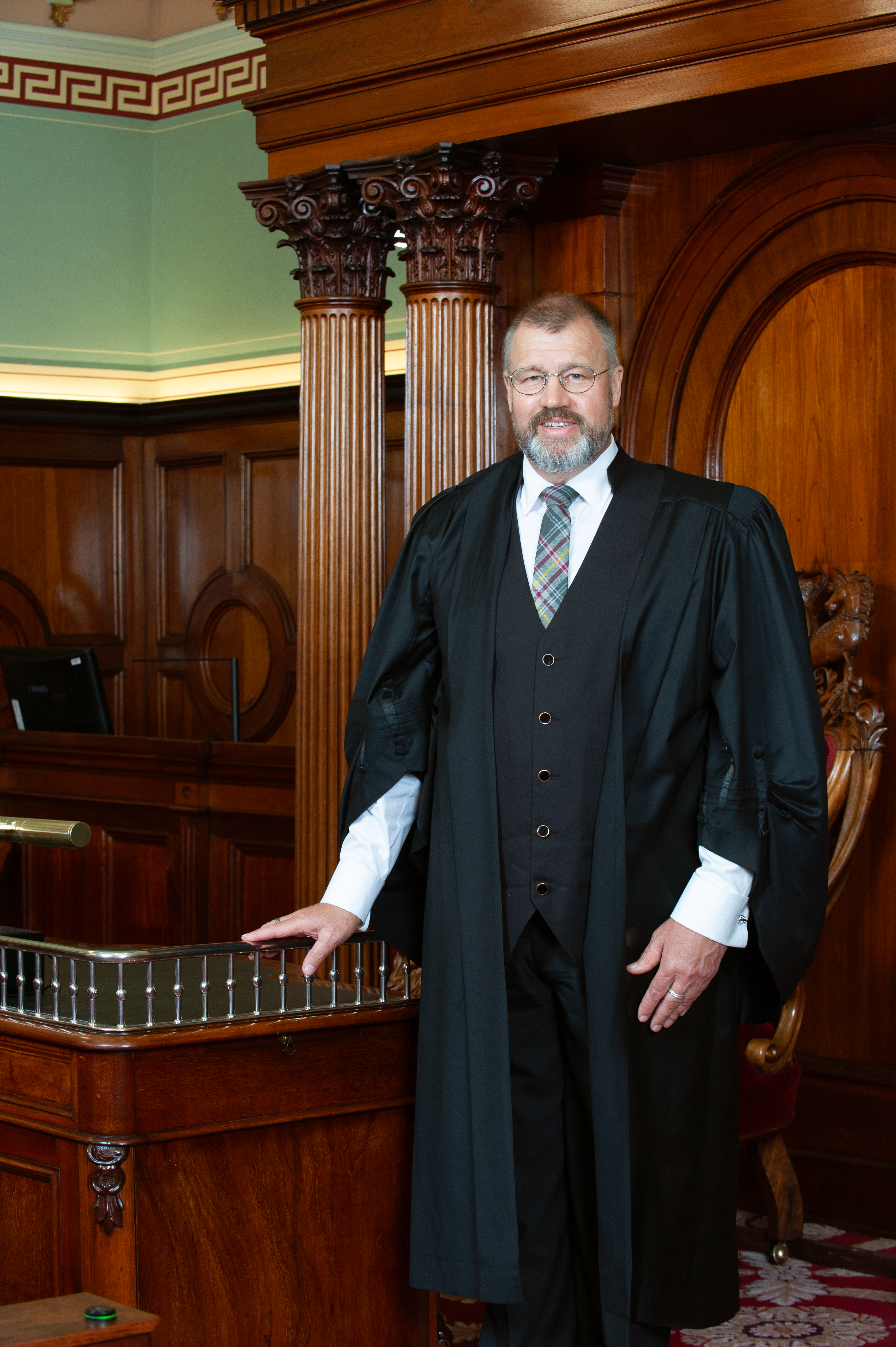Presiding Officers
Presiding Officers are Members of the Legislative Council or House of Assembly who are elected to run the meetings of that House. In the Parliament of Tasmania, the Presiding Officers are the Speaker of the House of Assembly (lower House) and the President of the Legislative Council (upper House).
President of the Legislative Council

Hon Craig Farrell MLC
President since 2019
Background
The office of Legislative Council President actually has a longer history than its title, for in the original Legislative Council (1825-55) the post carried the title of Speaker. When Tasmania gained a bicameral (two house) Parliament in 1856, this title passed to the lower House, as was the case in Great Britain, and the Legislative Council post became known as the President.
Roles
These are similar to those of any other Presiding Officer of a Parliament, especially those which follow the English model. Fundamentally, this requires the maintenance of order in the Chamber during parliamentary sittings. The President does not have a vote in Council debate so as to help maintain a degree of neutrality should he or she need to rule if disputes occur. However the President may take part in the Committee stage of debate on any Bill as it deals with the detail rather than the policy or principle of the legislation. Finally, the President may also be called upon to cast a vote at times when the vote on the Floor of the Council has become deadlocked.
The President's authority in the Chamber during sittings is rarely questioned, except when on occasion a Member may take objection to one of his rulings. It is the President who determines who shall speak, and all Members are supposed to direct their speeches through the President rather than directly to other Members. If there are queries as to the validity of issues before the Council it is the President, often in consultation with the Clerk of the Council , who settles the issue.
Outside the sittings of the Council, the President exercises the authority of the most senior officer of the Parliament, and is acknowledged in standing immediately after the members of the Executive Council (the Governor and the Cabinet). They are the representative of the Council in all matters, including dealings with the Governor and other dignitaries, and are responsible for conveying Bills which have been passed by the Parliament to the Governor for the Royal Assent.
The President is also responsible for the administration and smooth operation of the Legislative Council. They are a member of various committees which affect the running of Parliament and the maintenance of Parliament House, and ultimately responsible for the appointment of staff.
Election
A new President is elected when the former President retires; because of the periodic nature of Council elections the post does not fall vacant when there is a change of government. Members of the Legislative Council (MLCs) usually meet in private to determine who should become the next President. When the Council next sits the normal procedure is for there to be only one candidate (as agreed to in the earlier meeting) who is subsequently declared elected. Once a new President has been elected they take the Chair of the Council, thank the Council for its confidence, and then go to Government House to present themselves as the new President and thus the Council's new representative in its dealings with the Governor.
See also
Speaker of the House of Assembly

Hon Jacquie Petrusma MP
Speaker since 2025
Westminster origins
In English parliamentary history the Monarch appointed a person to be an intermediary between the Crown and the Parliament. By 1377 this person had come to be called Speaker - because he spoke to the monarch - and after 1600 the role of the Speaker was becoming more clearly defined. Increasingly however the Parliament sought to express its independence; for example in 1629 Speaker John Finch tried to adjourn the House on the orders of the King but was physically restrained by some of the Members. When he was released the King adjourned Parliament for 11 years.
In 1641 when King Charles I entered the House to arrest five MPs, a more independent Speaker, William Lenthall, when asked where they were, said that he 'had neither eyes to see, nor tongue to speak in this place, but as the House is pleased to direct me, whose servant I am here'. It is in this tradition that Speakers ever since have maintained that they are the 'servant' of the House.
Royal displeasure was however something to be feared, for in other times the Speaker has been beheaded, e.g. Speaker Bussy by King Henry IV. This fate has led to a practice whereby each new Speaker, after nomination and election by ballot of MPs, shows apparent reluctance to accept the post, and must be conducted to the Chair (taken with mock force) by two other MPs. Nonetheless it is today a prized position and each Speaker humbly vows to perform the duties of the position 'with dignity and impartiality'. These duties include maintaining order in the House, granting permission to speak, and other matters..
Speakers in Tasmania
When Tasmania gained an elected Legislative Council the Presiding Officer was known as the Speaker. This was the case from 1851 to 1856 when Tasmania achieved full responsible self-government and gained two Houses of Parliament. From then on the Legislative Council Presiding Officer has been known as the President, and the Presiding Officer of the lower Chamber, the House of Assembly, has been known as the Speaker.
Roles
The Speaker must:
- maintain, in an impartial, non-partisan manner, the order and security of the House and restrain unruly or unparliamentary behaviour;
- maintain the integrity and independence of the Parliament and safeguard its authority and protect its Members. This includes close involvement with the Standing Orders and Privileges Committees;
- undertake official duties for and to represent the Parliament, for example to transmit approved money Bills to the State Governor for Royal Assent, and assisting with VIP visits.
To assist their independence, Speakers do not have a vote in the normal parliamentary sense. Instead they have a casting vote which is used to decide an issue that has been deadlocked on an equal vote.
Election
The Speaker of the House is chosen by secret ballot of Members of the House of Assembly (MPs) on the first sitting day after each election, and usually, but not always, comes from the party with a majority on the Floor of the House of Assembly. After their election, the Speaker makes a formal visit to the Governor at Government House to reflect the ancient relationship between Speaker and monarch before returning to Parliament House.
